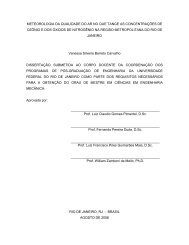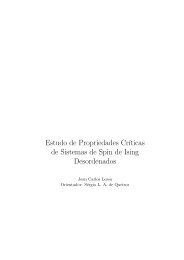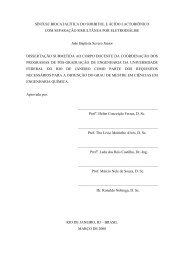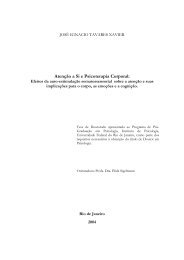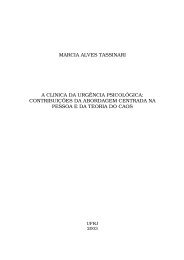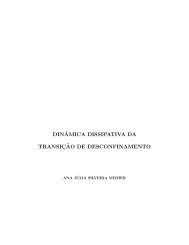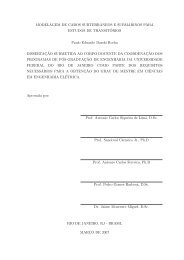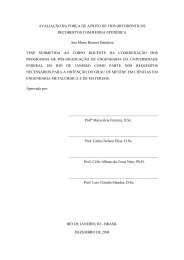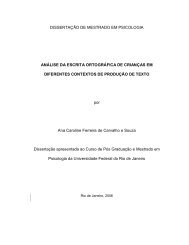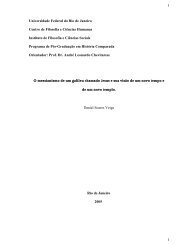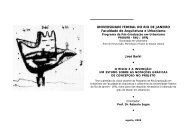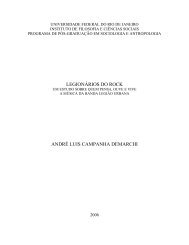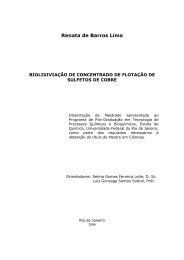- Page 1 and 2: UNIVERSIDADE FEDERAL DO RIO DE JANE
- Page 3 and 4: Pacheco, Ana Lucia Paes de Barros.
- Page 5 and 6: AGRADECIMENTOS À professora Maria
- Page 7: RESUMO Pacheco, Ana Lucia Paes de B
- Page 11 and 12: 1.1 - Considerações iniciais 1 -
- Page 13 and 14: A partir da experiência de trabalh
- Page 15 and 16: No caso do Brasil, as famílias che
- Page 17 and 18: Diante desta situação, a particip
- Page 19 and 20: seu cotidiano, que estratégias uti
- Page 21 and 22: Desta forma, pretendemos apresentar
- Page 23 and 24: marcantes para o tecido das relaç
- Page 25 and 26: maioria das vezes, não se encaixam
- Page 27 and 28: é como fossem um dom divino, dado
- Page 29 and 30: que para os homens chegar em casa e
- Page 31 and 32: De certo que a participação da mu
- Page 33 and 34: parentesco ou vizinhança e, assim,
- Page 35 and 36: 25 de um toque mágico de "varinha
- Page 37 and 38: carreiras que, até pouco tempo atr
- Page 39 and 40: trazer uma relativa autonomia para
- Page 41 and 42: 31 Metade das mulheres que trabalha
- Page 43 and 44: Na mesma direção como assinala Ma
- Page 45 and 46: serviços pessoais, educativos, san
- Page 47 and 48: conciliação entre eles. Segundo G
- Page 49 and 50: Deste modo, para se conhecer melhor
- Page 51 and 52: Talvez uma situação que contribua
- Page 53 and 54: empregadas domésticas, 12 são sec
- Page 55 and 56: maior responsabilidade e de maiores
- Page 57 and 58: Gostaríamos de mencionar ainda a s
- Page 59 and 60:
contribuído para isto - conjuntame
- Page 61 and 62:
elativos mais elevados desse tipo d
- Page 63 and 64:
53 Eles desejam ser reconhecidos co
- Page 65 and 66:
individualizadas e sem sentido, tor
- Page 67 and 68:
etraduzir em seus próprios termos
- Page 69 and 70:
Família chefiada por mulher não
- Page 71 and 72:
doméstico. Segundo Fonseca (2000),
- Page 73 and 74:
63 A autonomia das mulheres pobres
- Page 75 and 76:
se refere aos aspectos econômicos,
- Page 77 and 78:
está ausente, como no caso de viú
- Page 79 and 80:
especificamente, no país - o aumen
- Page 81 and 82:
Segundo Perpétuo & Fonseca (1997),
- Page 83 and 84:
escolaridade das mulheres são mais
- Page 85 and 86:
Janeiro e de São Paulo alcançaram
- Page 87 and 88:
sozinhas a situação. Estas estrat
- Page 89 and 90:
de todos e isto não significa nece
- Page 91 and 92:
as diferenças e, sempre que possí
- Page 93 and 94:
Foi considerado outro parente a pes
- Page 95 and 96:
De fato, as instituições pública
- Page 97 and 98:
Tabela 3.1 - Distribuição dos mor
- Page 99 and 100:
Bloco 7: Condições de conservaç
- Page 101 and 102:
entrevistas foram relativas a probl
- Page 103 and 104:
poderíamos trazer melhorias para o
- Page 105 and 106:
tendências apontadas nos últimos
- Page 107 and 108:
Tabela 3.3 - Distribuição dos mor
- Page 109 and 110:
tamanho da prole e, conseqüentemen
- Page 111 and 112:
Tabela 3.6 - Idade média por posi
- Page 113 and 114:
3.5.3 - Participação e ocupação
- Page 115 and 116:
parte delas (27,4%) estão desocupa
- Page 117 and 118:
por mulheres, têm uma maior carga
- Page 119 and 120:
Tabela 3.11 - Distribuição das ho
- Page 121 and 122:
função da gravidez e da necessida
- Page 123 and 124:
3.5.5 - Condições sanitárias e d
- Page 125 and 126:
homens e por mulheres). O tipo mais
- Page 127 and 128:
mais limpos, arrumados e conservado
- Page 129 and 130:
família mais como uma estratégia
- Page 131 and 132:
121 Cabe lembrar que, muito freqüe
- Page 133 and 134:
4 - CONTANDO UM POUCO DA HISTÓRIA
- Page 135 and 136:
dimensão histórico-cultural. Com
- Page 137 and 138:
127 os valores considerados própri
- Page 139 and 140:
129 QUADRO 2: Grupo B - Caracterís
- Page 141 and 142:
131 A escolha por trabalhar com mul
- Page 143 and 144:
motivação para o trabalho fora do
- Page 145 and 146:
aceito por todas as entrevistadas,
- Page 147 and 148:
que faziam menção, direta ou indi
- Page 149 and 150:
chefes de família constroem frente
- Page 151 and 152:
sobrevivem, principalmente, com a a
- Page 153 and 154:
Cursou até a 2 a série do ensino
- Page 155 and 156:
companheiro e os outros 2 do seu se
- Page 157 and 158:
Entrevistada 10B 147 Tem 32 anos e
- Page 159 and 160:
perto. 149 Cursou até a 4 a série
- Page 161 and 162:
151 dizer que eu sou muler ... tô
- Page 163 and 164:
dimensão da vida privada, parece h
- Page 165 and 166:
155 A participação da mulher de b
- Page 167 and 168:
157 sem contar que a gente que tem
- Page 169 and 170:
domésticas contrastava com a baixa
- Page 171 and 172:
ainda tem que dar conta do problema
- Page 173 and 174:
vezes relacionados a servidão, hum
- Page 175 and 176:
tarefas domésticas mais rápidas e
- Page 177 and 178:
Como se pode ver nas falas acima, n
- Page 179 and 180:
No cotidiano familiar, chama a aten
- Page 181 and 182:
entrevistadas podemos perceber que
- Page 183 and 184:
olsa alimentação, refeição para
- Page 185 and 186:
. 175 Minha gravidez foi mais ou me
- Page 187 and 188:
filhos aparece de forma bastante am
- Page 189 and 190:
valores e padrões de uma sociedade
- Page 191 and 192:
mulheres trabalhadoras da zona sul
- Page 193 and 194:
conjugais - oficializadas ou não -
- Page 195 and 196:
situações, não fica claro quem r
- Page 197 and 198:
dos deveres que correspondem a esta
- Page 199 and 200:
O pai das crianças sumiu, não dá
- Page 201 and 202:
191 Passei a minha gravidez toda, e
- Page 203 and 204:
geralmente de impotência, carênci
- Page 205 and 206:
195 Não pretendo arrumar mais home
- Page 207 and 208:
elação(ções). Tal fato nos leva
- Page 209 and 210:
ompimento se deu, a sobrevivência
- Page 211 and 212:
econômicos, não tendo, por isso,
- Page 213 and 214:
ecursos escassos, da necessidade de
- Page 215 and 216:
205 deixa elas aqui e depois que vo
- Page 217 and 218:
educação e moradia, bem como por
- Page 219 and 220:
ampliação de suas habilidades e d
- Page 221 and 222:
acompanhar para que eles atendam ef
- Page 223 and 224:
213 voltar pra ele, mas nada de con
- Page 225 and 226:
praticamente todas as mulheres mora
- Page 227 and 228:
217 família, ter alguém que compr
- Page 229 and 230:
expressam o desejo de ter melhores
- Page 231 and 232:
naturalizar a divisão sexual do tr
- Page 233 and 234:
mulheres são mais pobres do que aq
- Page 235 and 236:
225 É interessante lembrar, ainda,
- Page 237 and 238:
filhos, continua a prevalecer. 227
- Page 239 and 240:
social mais amplo e não apenas com
- Page 241 and 242:
Boyd, E. R. (2002). “Being there
- Page 243 and 244:
233 Fundação SEADE (2002a). Arran
- Page 245 and 246:
Nicolaci da Costa, A. M. (1994). A
- Page 247 and 248:
Sarti, C. A. (1996). A família com
- Page 249 and 250:
ANEXO 1 239
- Page 251 and 252:
241 20. Este banheiro é de uso: 1.
- Page 253 and 254:
243 BLOCO 5 - Trabalho e Renda dos
- Page 255 and 256:
245 BLOCO 8 - Condições de conser
- Page 257 and 258:
Tabela A.2.1 - Distribuição dos n
- Page 259 and 260:
Tabela A.2.4 - Taxa de atividade do



